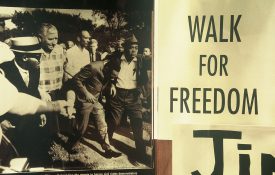-
Why Shoppers Just Can’t Resist Clearance Sales
TIME: January is prime time for shoppers stalking “further reductions” on merchandise that didn’t sell for Christmas or during the post-Christmas and post-New Year’s sales. In other words, it’s prime time for consumers to buy things they shouldn’t, even at 75% off. For some shoppers, clearance racks are like catnip. The impressive differences between the “original prices” and the dramatically marked-down rates draw them in, leaving the impression that these deals are just too good to pass up. Yet the truth is that a “deal” isn’t a deal when you buy things you don’t end up using, and you spend money you wished you hadn’t. Read the whole story: TIME
-
To Keep Your Office Resolutions, Start Small
The New York Times: Q. It’s two weeks into the new year, and you can already see your work-related resolutions start to fall by the wayside. This happens every year, so why do you keep setting these kinds of goals? A. We live in a very goal-oriented culture. And we are accustomed to setting goals for the new year in the belief that they help us move forward in big and small ways, says E.J. Masicampo, an assistant psychology professor at Wake Forest University in Winston-Salem, N.C., who studies goals and goal planning. “Goals can be extremely effective, depending on how people set and approach them,” he says.
-

Claims of “Post-Racial” Society and Other Denials of Racism May Reflect Ignorance of History
Commonly observed differences in how groups perceive racism may be explained by ignorance about — and even denial of — the extent of racism over the course of history, a psychology study suggests.
-
If We Go Over the Fiscal Cliff, Will People Spend or Save? Childhood Environments May Hold the Key
In the face of hard times, which strategy gives us the best shot at survival: saving for the future or spending resources on immediate gains? The answer may depend on the economic conditions we faced in childhood, according to new research published in Psychological Science, a journal of the Association for Psychological Science. Drawing on life history theory, Vladas Griskevicius of the University of Minnesota’s Carlson School of Management and colleagues hypothesized that the strategy a person takes when times are tight may be determined, at least in part, by features of their childhood environment.
-
How To Make Better New Year’s Resolutions
Slate: It’s that season again, when we resolve to accomplish a list of goals in the coming year. Not infrequently, these are the goals that we were resolved to accomplish during the preceding year. If you were to ask Princeton psychologist Eldar Shafir or Harvard economist Sendhil Mullainathan for a better New Year’s strategy, they’d likely suggest that the best resolution you can make is to do fewer things in 2013. The researchers argue that when busy people get busier, it leads to ignored deadlines, a cluttered desk, and a vicious cycle of falling further and further behind.
-
What’s the best way to learn? Psychologists tackle studying techniques
CBS News: What's the best way to study for a test? A new study says taking practice tests and engaging in distributed practice -- which means sticking to a schedule of spreading out your studying over time -- work the best. Surprisingly, the methods that were least effective when it came to getting a good grade on the big test were: summarization, highlighting, keyword mnemonics, creating imagery for text and re-reading. "I was shocked that some strategies that students use a lot -- such as re-reading and highlighting -- seem to provide minimal benefits to their learning and performance," study author Dr.

